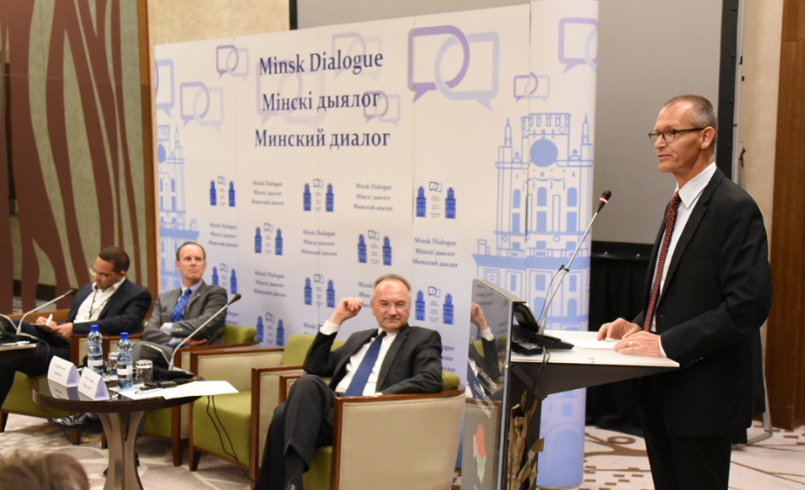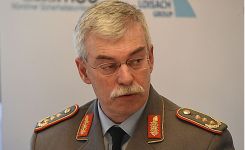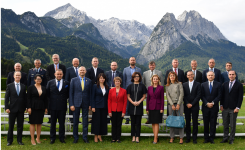- George C. Marshall European Center for Security...
- Non-Resident Programs
- Marshall Center Faculty Rekindles Relations wit...
Marshall Center Faculty Rekindles Relations with Belarus at Minsk Economic Security Conference
minsk_dialog.png

By James E. Brooks,
George C. Marshall European Center Public Affairs Director
Garmisch-Partenkirchen, GERMANY (June 6, 2017) - Six George C. Marshall European Center faculty travelled to Minsk, Belarus, June 1-2 to share ideas and stimulate discussion at a two-day international conference focused on economic security in the world.
The conference was organized by the Ministry of Foreign Affairs of Belarus, a local think tank called the Minsk Dialogue, and the Konrad Adenauer Foundation.
Belarus Minister of Foreign Affairs Vladimir Makei emphasized the importance of the international conference for his nation in his opening remarks.
“The conference is focused on the topic of economic security in terms of world globalization. This is an extremely urgent and important topic. The consideration of certain problems in its global context becomes an absolutely essential and natural condition of any dialogue on topical issues on the international agenda,” said Makei.
U.S. Embassy Belarus Charge d’affaires Robert Riley echoed Makei’s statement.
“We need to understand that changes are happening throughout the world. You cannot be economically dependent and be independent in all other aspects. It does not work like that. If you want to be truly independent, you need to work to strengthen economic security. We constantly talk about the diversification of trading partners. These are the key aspects of growth," Riley said.
The opportunity to travel and share perspectives on economic security in Belarus is a positive sign that the Marshall Center relationship with that nation is beginning to grow again.
“We focused on current trends in the global economy and what are some of the advantages and disadvantages of globalization; and how multilateral institutions like the World Bank and the International Monetary Fund operate and how countries like Belarus shape those multilateral institutions,” said Valbona Zeneli, program director for the Marshall Center’s Black Sea and Eurasia Program.
Traveling to Belarus were Marshall Center Dean Andrew Michta, Associate Director for International Liaison U.S. Ambassador Douglas Griffiths; Director, Black Sea and Eurasia Program Valbona Zeneli; Senior German Professor and Director, European Security Seminar Ralf Roloff; Professor of NATO and European Security Issues Pal Dunay and; Director, Countering Transnational Organized Crime Joe Vann.
The conference was broken down into four sessions that examined the economics of a globalized world, the impact of non-economic factors on global competitiveness and economic stability, regional economic integration, and bilateral and multilateral opportunities for security cooperation. Other speakers at the conference were German Ambassador to Belarus Peter Dettmar, Konrad Adenauer Foundation Belarus Director Wolfgang Sender and the head of the Minsk Dialogue Yauheni Preiherman.
“From my perspective, the most interesting part of this is not so much a panel discussion but actually observing the exchange between our hosts and the presenters, as well as the participants. Hearing their perspective is what I really find most interesting and quite frankly, the interest and reaching out in a dialogue. This was clear both in the comments made by the Minister of Foreign Affairs of Belarus and the other speakers,” said Michta.
According to Zeneli, economic security is an important topic for decision makers in a country like Belarus whose economy is slowly transforming itself to be more economies in the countries along its northern western and southern borders.
“I think is very important for countries like Belarus who are small in size, really find the niches in the global economy to increase their own competitiveness and achieve advantages from the global economy. Without economic prosperity you cannot have security. This is why this conference is important, not only for governments and policymakers, but for the average person to think about in this interconnected world,” Zeneli said.
Taking advantage the shifting winds of political change is one of the strengths of the George C. Marshall European Center.
“I think this is an example of something that only the Marshall Center can do because we're a German-American partnership. We bring with us not just an American perspective or German perspective but a mix of perspectives from both stakeholders. I think because of our partnership, we bring a platform for dialogue and engagement that no other organization can,” said Michta.
There are 118 Marshall Center alums from Belarus. Political differences between the east and west led Belarus to withdraw from Marshall Center programs in 2009. According to registrar records, the last time Marshall Center was invited and traveled to Belarus was in 1996. An indication that relations could improve arose last May when Belarus officials joined others from Bulgaria, Georgia, Latvia, Lithuania, Moldova and Poland in a Marshall Center non-resident program focused on regional energy security in Vilnius, Lithuania.


